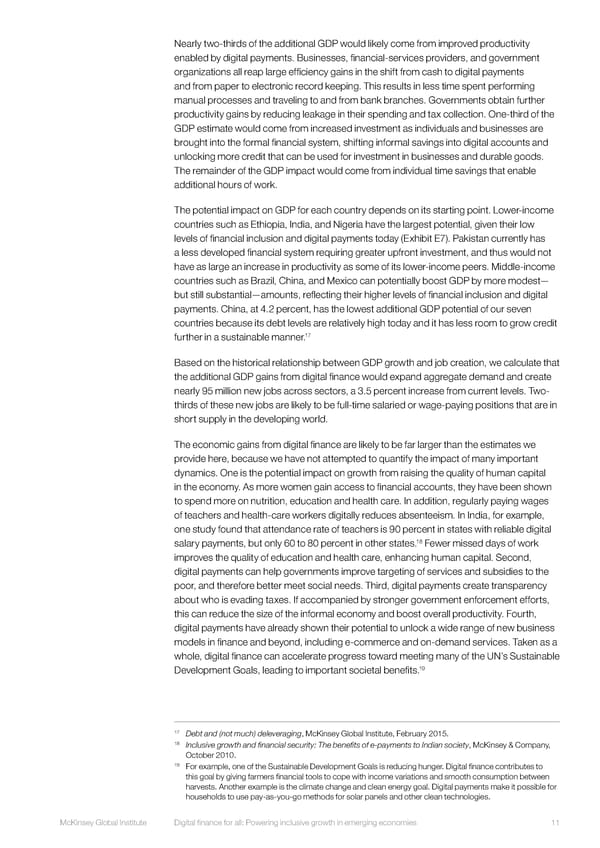Nearly two-thirds of the additional GDP would likely come from improved productivity enabled by digital payments. Businesses, financial-services providers, and government organizations all reap large efficiency gains in the shift from cash to digital payments and from paper to electronic record keeping. This results in less time spent performing manual processes and traveling to and from bank branches. Governments obtain further productivity gains by reducing leakage in their spending and tax collection. One-third of the GDP estimate would come from increased investment as individuals and businesses are brought into the formal financial system, shifting informal savings into digital accounts and unlocking more credit that can be used for investment in businesses and durable goods. The remainder of the GDP impact would come from individual time savings that enable additional hours of work. The potential impact on GDP for each country depends on its starting point. Lower-income countries such as Ethiopia, India, and Nigeria have the largest potential, given their low levels of financial inclusion and digital payments today (Exhibit E7). Pakistan currently has a less developed financial system requiring greater upfront investment, and thus would not have as large an increase in productivity as some of its lower-income peers. Middle-income countries such as Brazil, China, and Mexico can potentially boost GDP by more modest— but still substantial—amounts, reflecting their higher levels of financial inclusion and digital payments. China, at 4.2 percent, has the lowest additional GDP potential of our seven countries because its debt levels are relatively high today and it has less room to grow credit 17 further in a sustainable manner. Based on the historical relationship between GDP growth and job creation, we calculate that the additional GDP gains from digital finance would expand aggregate demand and create nearly 95 million new jobs across sectors, a 3.5 percent increase from current levels. Two- thirds of these new jobs are likely to be full-time salaried or wage-paying positions that are in short supply in the developing world. The economic gains from digital finance are likely to be far larger than the estimates we provide here, because we have not attempted to quantify the impact of many important dynamics. One is the potential impact on growth from raising the quality of human capital in the economy. As more women gain access to financial accounts, they have been shown to spend more on nutrition, education and health care. In addition, regularly paying wages of teachers and health-care workers digitally reduces absenteeism. In India, for example, one study found that attendance rate of teachers is 90 percent in states with reliable digital 18 Fewer missed days of work salary payments, but only 60 to 80 percent in other states. improves the quality of education and health care, enhancing human capital. Second, digital payments can help governments improve targeting of services and subsidies to the poor, and therefore better meet social needs. Third, digital payments create transparency about who is evading taxes. If accompanied by stronger government enforcement efforts, this can reduce the size of the informal economy and boost overall productivity. Fourth, digital payments have already shown their potential to unlock a wide range of new business models in finance and beyond, including e-commerce and on-demand services. Taken as a whole, digital finance can accelerate progress toward meeting many of the UN’s Sustainable 19 Development Goals, leading to important societal benefits. 17 Debt and (not much) deleveraging, McKinsey Global Institute, February 2015. 18 Inclusive growth and financial security: The benefits of e-payments to Indian society, McKinsey & Company, October 2010. 19 For example, one of the Sustainable Development Goals is reducing hunger. Digital finance contributes to this goal by giving farmers financial tools to cope with income variations and smooth consumption between harvests. Another example is the climate change and clean energy goal. Digital payments make it possible for households to use pay-as-you-go methods for solar panels and other clean technologies. McKinsey Global Institute Digital finance for all: Powering inclusive growth in emerging economies 11
 EXECUTIVE SUMMARY Page 10 Page 12
EXECUTIVE SUMMARY Page 10 Page 12